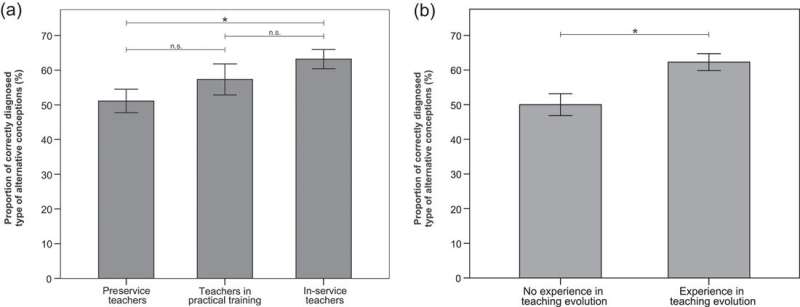Evolution: Biology teachers often fail to recognise misconceptions

"Cheetahs have become faster and faster because they have realized that it is necessary"—this statement should make teachers sit up and take notice when they teach the principles of evolution. Many students have incorrect ideas about it. They fail to recognize the principle of random variations that represent a survival advantage and instead assume that evolutionary processes are directed towards a goal, that a species has unchanging traits, that useful characteristics are inherited, or they anthropomorphise organisms by assuming that they act consciously. "In everyday life, such concepts are sometimes helpful, but scientifically they are inaccurate," says Nina Minkley. "Teachers need to diagnose them in biology lessons and take targeted countermeasures, because they otherwise get in the way of a scientifically correct understanding."
To find out how good biology teachers are at identifying and addressing such misconceptions, Tim Hartelt conducted an online survey in spring 2020. One-hundred eighty-two pre-service, in-service, and biology teachers in practical training took part. They were confronted with statements from students about evolution and were asked to indicate whether they agreed or disagreed with these statements. If they disagreed, they were also asked to indicate on what scientifically incorrect concept the relevant statement was based and how they would address it.
Teaching experience helps
"The study showed that the ability to diagnose misconceptions and deal with them appropriately varies depending on the level of education," says Nina Minkley. Participants with no teaching experience in the topic of evolution correctly identified about half of the misconceptions. Experienced teachers diagnosed around 60 percent, which suggests that experience helps to master this complex task. "We were surprised that many of the participants did not recognize the misconceptions at all," says Nina Minkley. "Moreover, less than half would respond to the misconceptions in a manner that was constructive in terms of learning theory; failure to address them could lead to the consolidation of the misconceptions or even to new misconceptions."
Based on the results, the researchers argue that teachers should receive special training to help them respond appropriately to students' misconceptions.
More information: Tim Hartelt et al, Teachers' ability to diagnose and deal with alternative student conceptions of evolution, Science Education (2022). DOI: 10.1002/sce.21705
Provided by Ruhr-Universitaet-Bochum




















